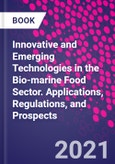Innovative and Emerging Technologies in the Bio-marine Food Sector: Applications, Regulations, and Prospects presents the use of technologies and recent advances in the emerging marine food industry. Written by renowned scientists in the field, the book focuses primarily on the principles of application and the main technological developments achieved in recent years. It includes technological design, equipment and applications of these technologies in multiple processes. Extraction, preservation, microbiology and processing of food are extensively covered in the wide context of marine food products, including fish, crustaceans, seafood processing waste, seaweed, microalgae and other derived by-products.
This is an interdisciplinary resource that highlights the potential of technology for multiple purposes in the marine food industry as these technological approaches represent a future alternative to develop more efficient industrial processes. Researchers and scientists in the areas of food microbiology, food chemistry, new product development, food processing, food technology, bio-process engineers in marine based industries and scientists in marine related areas will all find this a novel resource.
Please Note: This is an On Demand product, delivery may take up to 11 working days after payment has been received.
Table of Contents
1. Principles, equipment and recent advances in technology for marine sources
2. Ultrasound-assisted extraction of proteins and carbohydrates of marine resources
3. Ultrasound-assisted extraction of lipids, carotenoids and pigments from marine resources
4. Other Ultrasound assisted processes and regulations from marine sources
5. Principles, equipment and recent advances in pulsed electric fields from marine resources
6. Pulsed electric fields for the extraction of proteins and carbohydrates from marine resources
7. PEF for the extraction of lipids, carotenoids and pigments from marine resources
8. Other pulse-assisted processes and regulations from marine resources
9. Principles, equipment and recent advances in supercritical fluids equipment from marine resources
10. Supercritical fluid extraction of proteins and carbohydrates of marine resources
11. Supercritical fluid extraction of lipids, carotenoids and pigments from marine resources
12. Other supercritical fluid processing and regulations from marine resources
13. Principles, equipment and recent advances in microwave processing
14. Microwave-assisted extraction of proteins and carbohydrates of marine resources
15. Microwave-assisted extraction of lipids, carotenoids and pigments from marine resources
16. Other Microwave-assisted processes and regulations
17. Application of ionic liquids to extract high-value compounds from marine biomass
18. Application of pressurized liquids to extract high-value compounds
19. Application of plasma technologies for food preservation from marine resources
20. High-pressure processing for food preservation of marine resources








